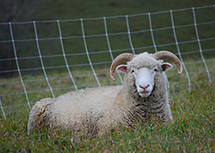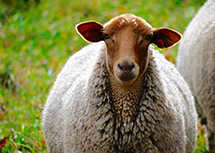Dorset Horn
The Dorset Horn is an ancient breed developed in the southwestern valleys of England. It was imported into the United States in the 1860s. Dorset Horn sheep are medium size sheep with lofty white to cream fleece. Both ewes and rams have horns. They are excellent grazers and the ewes are high milk producers and good mothers. Dorset Horn can breed in the fall or the spring which can extend the availability of lamb almost year round. The Dorset Horn is currently listed as threatened by The Livestock Conservancy.


